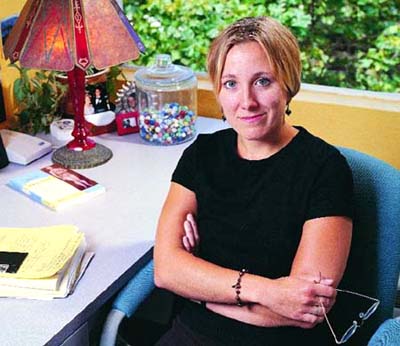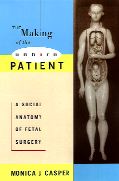
As a researcher, sociologist Monica J. Casper likes controversy. By that measure, she could hardly have picked a better topic for her first book than fetal surgery, a subject that touches on women's health, reproductive rights, and access to medical care.
The notion of trying to save a doomed baby by opening a pregnant woman's uterus, partially removing the fetus, correcting an abnormality, and returning the fetus to the womb until delivery is mind-bending, evoking reactions that range from awe to discomfort. Like the extraordinary measures that are now available to prolong the lives of the very elderly, fetal surgery could redefine some basic assumptions about life, death, and the appropriate use of medical technology.
In her new book, The Making of the Unborn Patient: A Social Anatomy of Fetal Surgery, Casper explores the ethics of a procedure that is being heralded as the latest medical miracle despite unanswered questions about the risks it poses to both mother and fetus. The book is the first in-depth examination of fetal surgery and is based in part on Casper's study of about 100 surgeries performed at a hospital where surgeons are pioneering the technique. (To protect the privacy of patients and medical staff, Casper does not identify the hospital in her book.)
Fetal surgery is used to remove tumors and to correct life-threatening structural defects and abnormalities, such as blocked urinary tracts and congenital diaphragmatic hernias, which allow organs to migrate into the chest cavity and inhibit lung development. Still largely experimental, fetal surgery could become a more routine treatment for some maladies.
"We love medical miracles in this culture--especially at both ends
of life," said Casper, an assistant professor of sociology at UCSC
and an affiliate of the Stanford University Center for Biomedical
Ethics. "We're able to construct these tools that allow us to do
amazing things, and medicine has done a very good job of promoting
the idea that we can save lives this way. But with each of these
'medical miracles,' there is a downside." 
Casper's book explores the many implications of a controversial new practice.
Casper's study revealed a fetal mortality rate that averages about 60 percent and can exceed 85 percent for some procedures. Because labor begins when the uterus is opened, women who endure the procedure early in the second trimester must be confined to bed rest on antilabor medications for the duration of the pregnancy. Newborns, who typically arrive early and always by Cesarean section, require additional treatment after birth and may still face lingering impairment. Finally, the surgery may jeopardize a woman's ability to carry subsequent pregnancies to term.
For Casper, fetal surgery raises serious ethical questions about maternal sacrifice, the status of the fetus, and medical priorities. "Fetal surgery has been seen largely as a pediatric issue, not a matter of women's health," said Casper. "The ethical questions are enormous."
Fetal surgeons view the fetus as the patient, but does that mean the fetus is a person, asks Casper. What about the woman's role as patient? Could mothers be forced to undergo the procedure against their will? Like interventions at the end of life, does it make sense to try to save the life of an impaired fetus at all costs, financial and otherwise? What if the best surgical outcome is a severely disabled infant?
Despite the pressing questions surrounding fetal surgery, the procedure remains shrouded in secrecy at the few medical centers in the country that are performing it. Casper had to file Freedom of Information Act requests to obtain details about some of the 100 or so surgeries that had been performed at the hospital where she conducted her research, and she lost access to prospective and actual patients after surgeons gleaned the scope of her research.
Casper asserts that the ethics of fetal surgery are being overlooked in the public arena, where a generally positive reception by the media is curbing the scope of the discussion. Anti-abortion forces have embraced the procedure as "pro-life," and Casper predicts that fetal surgery could radically reshape abortion politics if it helps establish the fetus as a patient and a person independent of the mother.
Casper's goal in writing her book was to avoid simplistic answers. When pressed, she says she favors preserving fetal surgery only in a context that protects the woman's rights as an independent patient and only if it can be made safer for both fetuses and the women who choose it. But she expresses grave concern about spending limited health care dollars on a practice so fraught with medical and ethical uncertainty that will benefit so few.
--Jennifer McNulty